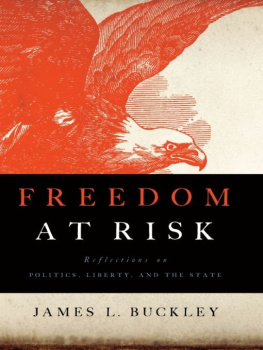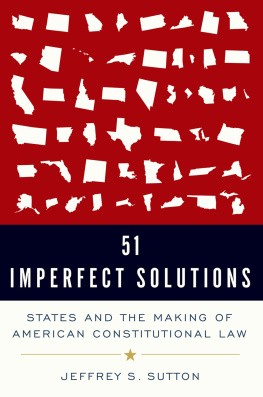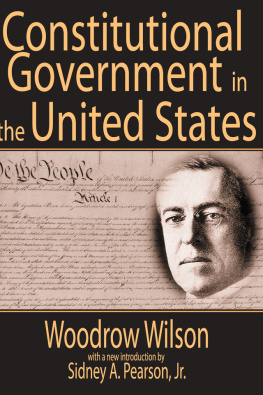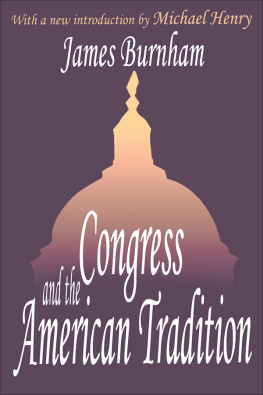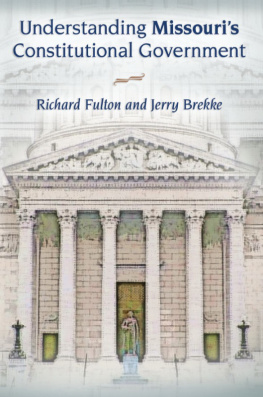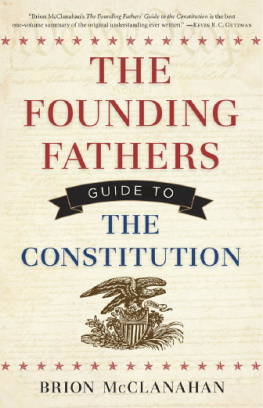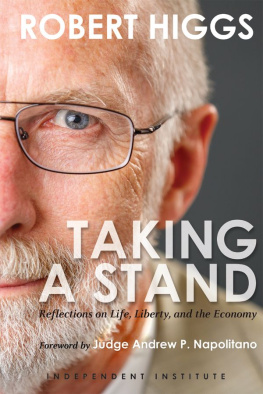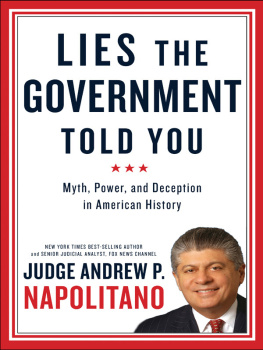Introduction
As I wrote in my memoir of sorts, Gleanings from an Unplanned Life, my life has largely been shaped by chance. While in the Navy in World War II, I decided to pursue the tranquil life of a country lawyer. But after I had spent four years of practice with a New Haven law firm in preparation for a move to the country, my father lured me to New York City to work for a group of companies engaged in oil exploration outside the United States.
Over the next seventeen years, I led a contented and highly private life with my wife, Ann, and our six children. Then something wholly unexpected occurred. I had neverevergiven any thought to public service. Nevertheless, for reasons too complicated to explain here, in 1968 I was recruited by New Yorks Conservative Party to run as a pro forma candidate for election to the United States Senate. Having tested the waters, I ran again two years later and was swept into office in a three-way race with a vote of 40 percent (a margin of victory just three points lower than Bill Clintons in 1992). Although rejected by an ungrateful electorate in 1976, I was later tapped by the Reagan administration, first for a position in the State Department and then for one in the federal judiciary. And so, through no planning of my own, I wound up serving in all three branches of the federal government: six years as a senator, two as an under secretary of state, and fifteen as a federal appellate judge.
Over those years, I had occasion to produce articles, speeches, and radio commentaries on a wide range of public issues. I recently started going through my files with the thought that my family might like a collection of my writings as a supplement to Gleanings from an Unplanned Life. But as I started reading these pieces, I found that although most of them were written years ago, many of them remain strikingly relevant to such current concerns as the intrusive growth of the federal government, environmental regulation, the place of religion in public life, energy policies, campaign financing, and judicial activism. And so I believe this collection may be of interest to a wider audience. The one new essay in this book is the first, On Liberty and the State. In it, I express my concerns over the dramatic expansion of federal authority in recent years and its implications for a free society, concerns that reflect my own experiences in government.
I was a member of the Senate during a turbulent period, one marked by often violent protests against the Vietnam War, major controversies over a host of domestic and foreign policy questions, and the Watergate scandals. To the New York Timess disappointment, I failed to grow during my six years in office. Instead, I brought a consistently conservative perspective to my analyses of the issues of those rocky days. Much of the material collected in this volume dates back to that period.
My State Department responsibilities (as the under secretary of state in charge of military and economic aid programs) dealt largely with technical subjects of only contemporary interest. As a consequence, I have included only one of my writings in that capacity. This book contains, however, several essays dealing with the foreign arena. These include discussions of our abandonment of South Vietnam, the importance of Radio Free Europe and Radio Liberty, and my experience as head of an American delegation to a United Nations conference.
I served on the U.S. Court of Appeals for the District of Columbia Circuit from 1985 until my retirement in 2000. Because judicial reasoning is inherently mind-numbing, I have included none of the several hundred opinions I wrote as a circuit judge. During those years, however, I had ample opportunity to address questions involving the Constitution and the role of federal judges that have been raised in the disgracefully politicized judicial confirmation hearings of recent times.
In the course of my years engaged in the writing, administration, or interpretation of federal laws, I have had more than the average citizens opportunity to observe their effects. My experience suggests that the most useful, but least honored, law is one not to be found in the statute booksthe Law of Unintended Consequences. It was formulated by an astute observer of the human condition who noted the frequency with which governmental remedies inflict greater harm than the ills they are intended to cure (e.g., the loss of low-income housing caused by rent control; the loss of lives resulting from the lighter cars built in response to automobile fuel-efficiency standards; the adverse impact of minimum-wage laws on minority teenage employment). This suggests that we should move with extreme caution before attempting to correct any more of our social and economic ills through government action. We have neither the wealth nor the resilience to cope with more than one or two panaceas at a time.
Finally, a word of explanation for occasional acts of self-plagiarism. Anyone whose job has entailed repeated talks to a variety of audiences will understand why certain passages will appear in more than one selection. If you have spent a fair amount of time getting words to say just what you want them to, you lose any sense of shame in repeating them in another context. I take comfort from the fact that Johann Sebastian Bach was frequently guilty of the same offense in his musical compositions.
On Liberty and the State
In 1976, when I was running for re-election to the United States Senate, it was my misfortune to have Daniel Patrick Moynihan for an opponent. (He beat me handily.) During our first encounter, Pat told the audience that although I was a fine fellow, I was stuck in the eighteenth century. In response, I confessed that I was guilty as charged and acknowledged my total commitment to the values and principles imbedded in the Declaration of Independence and the Constitution. I neglected to mention my fealty to the economic insights contained in Adam Smiths Wealth of Nations. The relevant question, of course, is whether those eighteenth-century values, principles, and insights remain relevant to the problems and needs of the vastly changed world in which we now live. I believe they do.
American independence was won and the Republic created by a remarkable generation of men who turned a rebellion against the British crown into a transforming moment in human history, one based on the revolutionary proposition that all men are created equal and are endowed by their Creator with fundamental rights that no government has the moral authority to set aside. But with the gaining of independence, the Founders faced the formidable task of creating a government that could operate effectively while respecting and protecting the liberties for which the Revolution had been fought. As James Madison described the challenge in The Federalist Papers

